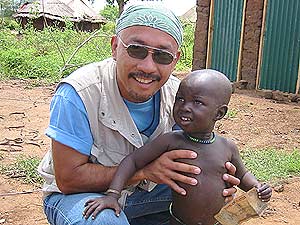|
Photos
Resources
|
May 30, 2005
 |
| Retired Air Force intelligence officer Alex Erolin uses his military training for Minneapolis-based American Refugee Committee's humanitarian work in Africa. (photo courtesy Alex Erolin/ARC) |
St. Paul, Minn. — Erolin retired in 2003 after more than 2 decades as a U. S. Air Force intelligence officer. Erolin says his new job is a variation on what he did in the military: "saving lives in a different way, and so that really attracted me," he says.
The 47-year-old Erolin is just back from Darfur in the Sudan. The civil war there has killed 180,000 people and displaced millions.
His most recent ARC assignment was in camps where the group is helping refugees with health needs. Erolin says the conditions are desperate. One camp has more than tripled in size from 40,000 to 120,000 people. "No amount of water and sanitation can deal with that kind of [growth] rate," he says.
Families, Erolin says, are living in rudimentary shelters. "Brush and sticks and leaves put together with plastic sheating," he says.
To make matters worse the camp is situated in a depression. "So everytime it rains, you know, a portion of the camp would be floating away," Erolin says.
His ARC job is to minimize risks to the group's workers in war zones. He tells them where it's too dangerous to travel, and he contacts local police or government officials before agency staff sets out on a mission.
However, Erolin says, the police and government aren't always reliable and, after all, this is humanitarian work. They're not doing their job, he says, if they don't go to the dangerous locations where people are suffering.
Erolin was born in the Philippines and emigrated to the United States as a teenager.
His most dangerous military assignment, he says, was in Bosnia. "Sarajevo was the close call because we were there as 'peacekeepers.' Invariably we'd be shot at by one group or another to make a political statement or something like that," he says.
Erolin says the change from being a military man armed with a weapon to that of being a humanitarian worker armed with nothing but goodwill is dramatic.
International law, he points out, dictates that humanitarian workers with non-governmental organizations, NGOs, be unarmed. But he says he missed the security of a sidefarm in Darfur.
The ARC's strategy to win acceptance, he says, is to persuade all sides the organization is neutral. Erolin recounts a recent visit to a war zone where a tribal group was hostile toward ARC's presence. "And they said, 'We don't want to work with you because you are partial, the NGOs, the international community is working with the rebels.' We explained to them that we are impartial and neutral, and we don't ask a kid or a man or a woman who is dying, we don't ask which tribe or village he comes from or she comes from, that we are there to help no matter what," he says. "And then they saw some kind of honesty probably, and they opened up and became more conciliatory and welcoming, really."
Not having an armed force to back him up, Erolin says, is a big change from his days in the military. He says he's using a lot more people skills, smiling and talking. Another big change is the lack of creature comforts the military often supplies soldiers. "We deployed with our gym, our fitness center, our chefs, so when you go there you still get your 3 squares a day. Working in the humanitarian environment, you eat whatever is available within the economy," he says.
Erolin says he feels fortunate to use his military skills in his new job helping people affected by war. "Before, you know, of course, pursuing democratic ideals and defending [them] and working in that capacity and now working for similar ideals, safety and existence and rights, human rights. I'm really, really happy I was given both these chances," he says.
Erolin says his next assignment is to Pakistan and Sri Lanka to assess working conditions there for ARC teams.





